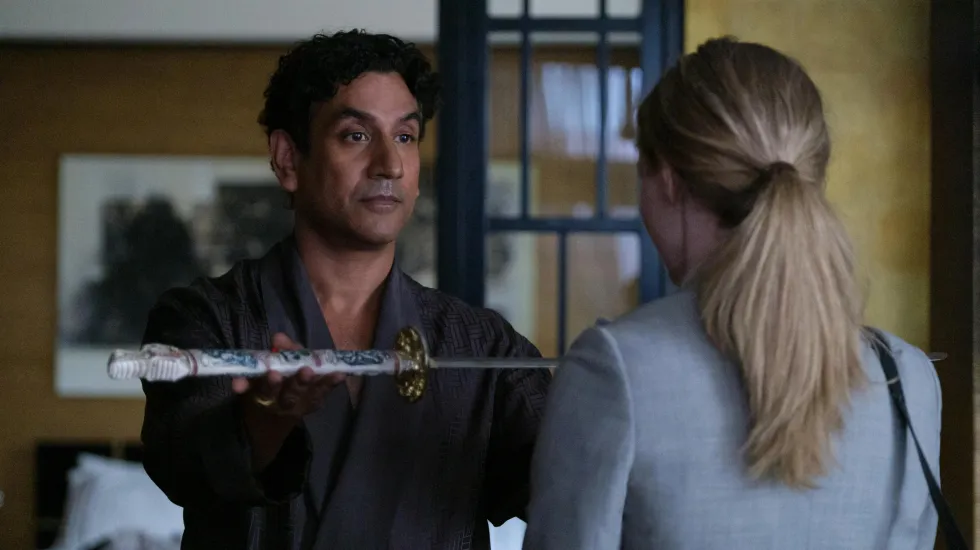
Forget about Anna Delvey from “Inventing Anna” or Simon Leviev aka “The Tinder Swindler.” They’re small potatoes compared to Elizabeth Holmes of Theranos infamy, as we’re reminded in the new Hulu limited series “The Dropout,” easily the best of the current wave of true-crime limited series.
With the first three episodes already streaming and subsequent chapters premiering weekly, this is an immensely entertaining and easily digestible chronicle of true-life events — and a fascinating psychological profile of a bizarre huckster and her breathtakingly wide-ranging long con, in which she duped scientists, investors and institutions, in the process becoming a media darling as a young, female tech “unicorn” smashing the glass ceiling. In 2014, Holmes was named one of the richest women in America by Forbes, with an estimated personal wealth of $4.5 billion; by 2018, her net worth was $0 and the SEC had charged her with “massive fraud,” which eventually resulted in four convictions.
The story of Holmes and her monumental failures with the blood-testing enterprise Theranos has been thoroughly chronicled via just about every platform imaginable, and yet there’s something lively and fresh about “The Dropout.” With Amanda Seyfried in a career-best performance, brilliant supporting work from the expansive supporting cast, crisp writing and first-rate production values, this is the real thing — unlike the sham medical technology Holmes peddled (and sold) to people who should have known better.
Three episodes available now on Hulu, with future episodes premiering on Thursdays.
“The Dropout” kicks off with Holmes giving a deposition in July of 2017, flashes back to a few telling moments from Holmes’ youth — gamely completing a race long after everyone else has long since crossed the finished line, learning Mandarin on tape on the ride home from high school — before picking up the story in the early 2000s, with Elizabeth about to enter Stanford just as her father Chris (Michael Gill) is getting laid off from the collapsing Enron. With the help of a family friend, the eccentric and perpetually resentful physician and inventor Richard Fuisz (William H. Macy), Elizabeth will still be able to attend Stanford, but first she takes a trip to Beijing, where she strikes up an unlikely friendship with Ramesh “Sunny” Balwani (Naveen Andrews), a millionaire tech entrepreneur nearly twice her age.
Once Sunny enrolls in Stanford, she becomes highly impatient with the natural progression of things. She’s tightly wound, bursting with creative energy and laser focused on becoming the next Steve Jobs, and she bristles when potential mentors such as the esteemed Professor Phyllis Gardner (Laurie Metcalf) tell her she should just enjoy being a 19-year-old freshman. “You don’t get to skip any steps,” says Gardner.
Rarely has such solid advice been so quickly dismissed.
Elizabeth comes up with a revolutionary idea: a portable diagnostic device that would require just a single drop of blood to provide near-instant analysis, which would greatly reduce the costs of testing and potentially save millions of lives through early detection. This is not the kind of idea that will wait for all those steps Professor Gardner talked about; it’s too grand, too important, too much of a game-changer, and the time for action is now! Elizabeth drops out of Stanford, convinces her parents to pour all of her tuition money into Theranos and begins rounding up personnel to staff the lab while she courts investors.
At this point, Seyfried as Holmes looks and acts the part of a super-bright but unsophisticated teenager, from her dance-to-iPod-music energy to her ultra-casual clothes to her girlish speaking voice. But as Theranos grows in scope and ambition, Elizabeth undergoes a remarkable and at times chilling self-makeover, from her trademark black-on-black fashion to her brutal treatment of employees to the evolution of her voice to the point where she almost sounds as if she’s imitating a man. Seyfried’s manipulation of Elizabeth’s vocal delivery is nothing short of amazing, as it never comes across as mere imitation. (In one of many intense exchanges with Sunny, who has become Elizabeth’s financial and romantic partner, Elizabeth unconsciously toggles back and forth between her two voices, depending on whether they’re arguing about business or their personal lives.)

Indelible characters abound as Holmes rounds up hundreds of millions of dollars in investments and becomes globally famous — even as the prototype for the device fails again and again. (And again.) National treasure Sam Waterston plays political giant George Shultz, who leads the clout-heavy board and becomes a grandfather figure to Elizabeth. Camryn Mi-young Kim shines as the promising new employee Erika Cheung, who idolizes Elizabeth until she discovers the whole operation is a sham and now must decide whether to become a whistle-blower. Alan Ruck is in peak Alan Ruck-mode as a hapless Walgreen executive who desperately wants to believe in Theranos. The great Stephen Fry lends heart and humanity to the story as a beloved, cancer-stricken chemist whose life is ruined when he starts questioning the science.
We’re amazed that so many educated, worldly, tech-savvy and financially acute parties would fall for Holmes’ ruse, often committing huge amounts of money and staking their reputations on a technology they’ve never actually seen work — because it doesn’t work. The artistry of “The Dropout” is that while it never makes excuses for Holmes and shines a harsh spotlight on her bizarre behavior and sociopathic-level lack of empathy, we see her as a three-dimensional human being who had unlimited potential and probably WOULD have achieved something great had she listened to those who were trying to get her to slow down and do things the right way.







